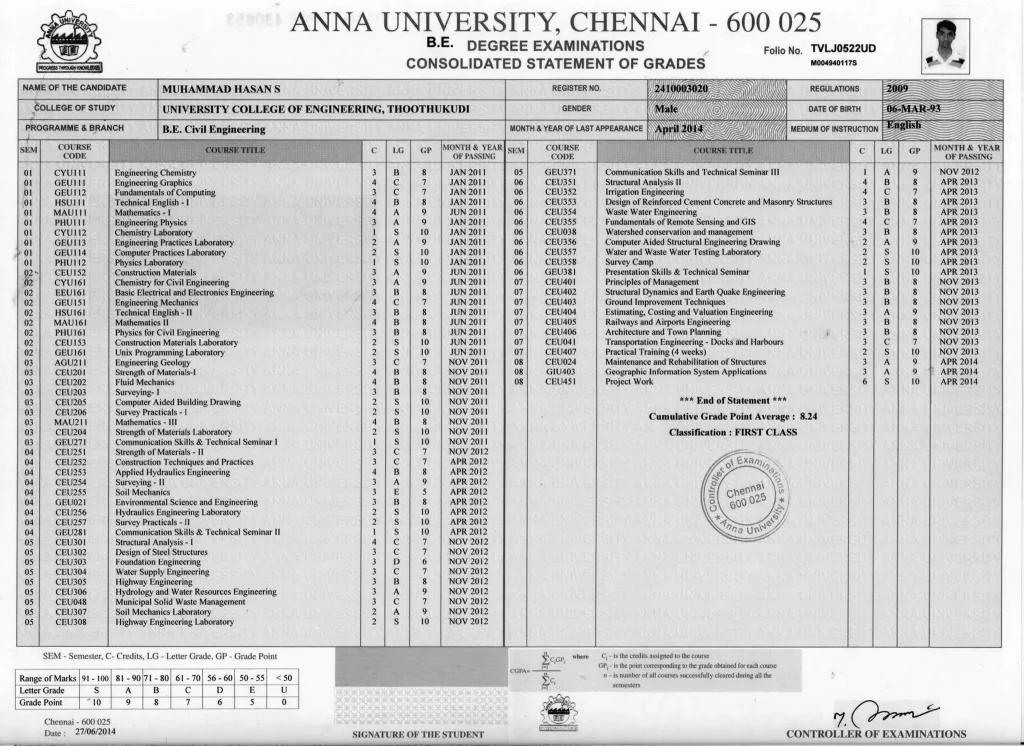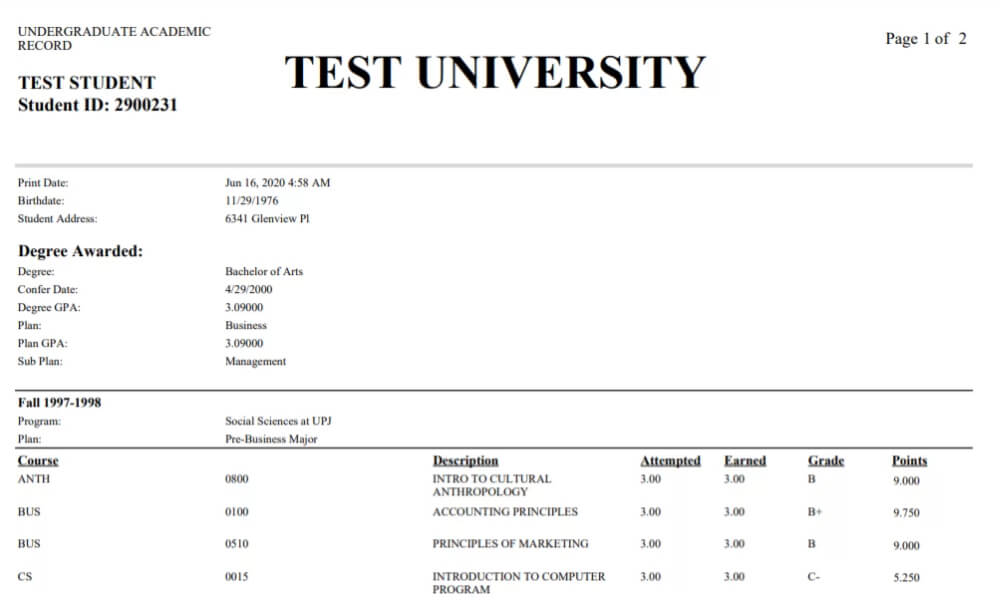Table of Contents
ToggleA Consolidated Marksheet is like a report card that gathers up all the grades you’ve earned throughout your academic journey. It’s basically a summary of your performance in every subject over the years or semesters. You get this sheet when you finish a specific course.
In simpler terms, if you’ve gone through a six-semester course, your consolidated mark sheet will contain grades from each of those semesters, along with your overall GPA (Grade Point Average) at the end of it all.
These sheets are super important documents. You’ll need them for various things, like applying for further education or jobs. They’re like your academic passport, showing where you’ve been and how well you did along the way.
What is a Consolidated Marksheet?
A consolidated marksheet is the certificate you receive after completing a programme, like a bachelor’s or master’s degree. It’s an official document from your university that lists all the subjects you studied and the marks/grades you earned in each one over the course of your programme. It’s like a grand total of your academic scores, neatly compiled for you.

What is the purpose of a Consolidated Marksheet?
This document is incredibly valuable because it serves as proof that you successfully finished your degree programme. It’s often required when applying for further studies or jobs. Employers and universities use it to verify your academic credentials and performance. It’s like a badge of honour which shows the hard work and dedication you put into earning your degree.
Uses of the Consolidated Marksheet
Your consolidated marksheet is a crucial document that you’ll need to keep safe and handy. It contains all the key details about your academic journey, including your programme name, the university you attended, your semester/yearly marks and your overall grade (like a CGPA or percentage). This information can be essential for the following:
- Programme or course
- Semester-wise marks obtained
- Students’ name and roll numbers
- College name
- University name providing the mark sheet
- Seal of the university
- Pass/Fail Status
Consolidated Marksheet Format
While the specific format may vary slightly between universities, most consolidated marksheets might look like this:
- Programme name and university/college
- Student’s name and roll number
- Exam centre and college codes
- Subject-wise marks per semester
- Overall division (first/second/third)
- Pass/fail status
- Issue date
- Registrar’s signature
- Relevant codes/identifiers
Types of Consolidated Marksheet
When it comes to consolidated marksheets, you might receive one of two types – either from your college or directly from the university.
- The college consolidated marksheet is issued by your specific college, featuring their letterhead, seal and the principal’s or registrar’s signature.
- The university consolidated marksheet comes straight from the university itself, with their official letterhead, seal and the signature of the Controller of Examinations or the Registrar.
Whichever type you receive, you can be sure it’s an official and legitimate document, as it bears the authoritative stamps and signatures from the respective institution.
Difference between Consolidated Marksheet and Individual Scorecard
An individual scorecard is like a mini report card, showing your marks and grades for just one semester or year. But a consolidated marksheet is the complete package, bringing all those individual scorecards together into one comprehensive record of your entire programme’s performance. It’s the all-in-one document that matters the most.
Consolidated Marksheet v/s Consolidated Certificate
The consolidated marksheet provides a detailed subject-wise breakdown of your scores, while the consolidated certificate gives a summarised overview of your overall academic performance. Which one you need depends on the specific requirements of the institution you’re applying to. Let’s read their deeper differentiation:
| Feature | Consolidated Marksheet | Consolidated Certificate (or Transcript) |
| Focus | Detailed breakdown of subject-by-subject performance | Overall academic achievement |
| Level of Detail | Provides individual subject scores (may include grades, letter grades, or percentages) | Presents a more summarised view, often including total marks, maximum marks and an overall grade/percentage |
| Additional Information | Might include semester-wise performance details like SGPAs and CGPAs | May not include details like SGPAs or specific subject scores |
| Purpose | Serves as a detailed reference for specific subject performance | Provides a concise overview for applications, scholarships, or further studies |
| Permanence | May or may not be permanent depending on the institution (sometimes issued with the final degree certificate) | Can be considered a permanent document |
What Should Be Included in a Transcript?

When submitting your transcript as an official document to universities abroad, it’s important to make sure it meets certain requirements. Here’s what you should look out for:
- Signatures and Stamps of Authority: Your transcript should bear the signature of appropriate authorities like the principal or registrar, along with the university’s official stamp or seal. This validates its legitimacy.
- Official Letterhead: The transcript must be printed on the university or college’s official letterhead.
- Proper Formatting: The format should follow the university’s standards, rather than the consolidated marksheet format commonly used in India. This ensures consistency with international norms.
- Sealed and Signed Envelopes: When sending your transcript abroad, make sure it’s in a sealed envelope with the appropriate authority’s signature and stamp across the seal. This maintains the document’s integrity during transit.
But what exactly goes into a transcript?
Here are some key elements:
- Programme Duration: Details about the total duration of your course, whether it’s measured in weeks, months, or years.
- Medium of Instruction: The language in which your classes were conducted (e.g., English, Hindi, etc.).
- Academic Division: Your overall division or class, such as First, Second, or Third, based on your performance.
- University Information: Background details about the university itself, like its establishment date, number of courses offered, headquarters location and contact information.
Consolidated Marksheet v/s Provisional Certificate
While these two documents are important records of your academic performance, they serve slightly different purposes. The table below should be able to clear your doubts on this!
| Consolidated Marksheet | Provisional Certificate |
| Permanent | Temporary |
| Valid lifetime | Valid till original degree issued |
| Provided with the permanent degree certificate | May be provided after last semester’s exam |
| Contains marks per subject (all semesters) | Establishes completion of the course |
| Contains SGPA and CGPA | No details of marks, SGPA, CGPA |
FAQs
How do I write a consolidated Marksheet letter?
Sir/Madam, I have recently completed ________ (Name of the degree/course) from _______ (Name of the university) in ______ (year). Please issue my consolidated mark sheet as soon as possible. Thank you.
What is a consolidated document?
These are financial statements that present important financial information gathered from a parent company and all of its subsidiaries.
What is a consolidated result?
When a company owns or has interests in other businesses (subsidiaries, associates, joint ventures) besides its main operations, it presents a combined financial report showing the overall performance across all those businesses. This combined report is known as the ‘consolidated result.
Does backlog appear in the consolidated Marksheet?
Yes, backlogs may appear in a consolidated marksheet. However, you are at the complete liberty of clearing those and applying for a marksheet clean of all backlogs.
What is the difference between a consolidated marksheet and a transcript?
A consolidated marksheet gives a summary of your overall marks and grades for an entire academic programme. A transcript, on the other hand, provides comprehensive details about each individual course, including credits, specific grades and any additional remarks.
Is Consolidated Marksheet acceptable everywhere?
An Indian consolidated marksheet will have to be converted to academic transcripts before applying to abroad universities. This can be done at your attended university only.
Do students need to apply for a consolidated mark sheet?
Universities and colleges in India usually circulate the consolidated mark sheet after 15 -20 days at the end of a semester.


















1 thought on “Top PGDM Courses In Canada: Universities & Eligibility”
I have done Bachelor’s in Culinary Arts from India and completed my graduation in the year 2022 .I am 22 years old. After graduation, I have done 1 year paid internship from USA .Now, I would like to take occupational experience and learn culinary skills and also do masters in Culinary arts.How can I find the college n best course / country where I can persue studying further